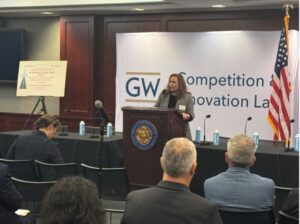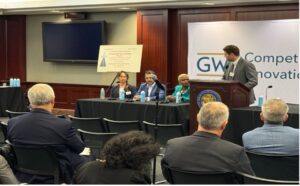On November 19, 2024, the Innovators Network held its first-ever Capitol Hill briefing co-hosted with the George Washington (GW) Competition & Innovation Lab. We tackled one of the most critical topics in innovation today: the evolving landscape of antitrust regulation and the challenges faced by policymakers in the United States and abroad. The briefing fostered dialogue on competition policies shaping the digital marketplace by drawing attendees from academia, industry, and the private sector. Discussions reflected both optimism and caution regarding the next Administration’s approach to competition policy while acknowledging the growing pains of global regulatory enforcement—and how innovators are preparing to navigate this turbulent environment.
Opening Remarks from Former Federal Trade Commission (FTC) Commissioner Christine Wilson
Our event began with opening remarks by Christine Wilson, former FTC commissioner and head of antitrust, competition, and trade at Freshfields. Christine drew a sharp contrast between how the European Union chooses to regulate technology and how the United States has generally favored “permissionless” innovation.
She examined the growing popularity of ex-ante regulatory approaches, such as the European Union’s Digital Markets Act (DMA), and their implications for the United States. “The U.S. faces a choice: adopt a preemptive regulatory model like the EU’s, or stay true to our innovation-driven roots, grounded in the consumer welfare standard and market-driven dynamism,” she argued.
Christine underscored a key takeaway: “Antitrust cannot be a one-size-fits-all hammer for every perceived market issue.” She criticized ex-ante frameworks for prioritizing regulation over innovation, rooted in an “abuse of dominance” approach to competition that elevates the grievances of specific competitors, which may often come at the expense of economic growth and consumer welfare. By contrast, the U.S. approach authorizes government intervention only when clear harm and market failure are evident, fostering an environment where innovation can thrive.

Christine highlighted the consequences of the EU’s regulatory strategies, citing the burdens imposed by the General Data Protection Regulation (GDPR) and those that are emerging already under the DMA. She warned that such frameworks often address narrow complaints from competitors while ignoring the broader consequences for consumers and innovation. “Europe’s tech sector has stagnated under these burdensome regulations,” she remarked. “Dynamism isn’t just nice to have—it’s essential for job creation and economic growth.” Christine also emphasized the need for due process and market-driven outcomes. “Procompetitive mergers must continue. Wraparound services for small businesses and consumers should not be presumptively illegal just because the companies excelling in these areas are ‘big.’”
She concluded her keynote with a call to action for Congress and the Administration: remain steadfast in upholding the consumer welfare standard. “The bipartisan goal should be positioning American industry to outcompete global adversaries like China. Giving weaker competitors the tools to undermine our digital economy risks handing our edge to foreign competitors.”
Panel Discussion
The program transitioned to an engaging panel discussion moderated by Graham Dufault, general counsel at the App Association. The panel featured Jocelyn Campbell, CEO of Health ComplyAI and maker of the Mori App; Elyse Dorsey, Innovators Network and GW fellow and partner at Kirkland & Ellis; and Aurelien Portuese, founding director of the GW Competition & Innovation Lab.

Aurelien began by providing an overview of the EU’s DMA. “The DMA seeks to level the playing field in digital markets by imposing ex-ante regulations on gatekeepers,” he explained. While intended to curb anti-competitive practices, Aurelien noted that the DMA’s rigid provisions challenge existing dynamics of data ownership and could disrupt small businesses.
Jocelyn offered a small business perspective, emphasizing the need for balance. “As an app developer, we depend on platforms to connect with customers,” she said. “While transparency is crucial, platforms must retain the flexibility to ensure user trust and safety.”
Elyse contrasted the regulatory philosophies of the United States and EU, highlighting the fundamental differences between the EU’s “abuse of dominance” standard and the United States’ consumer welfare standard. “The EU’s approach prioritizes protecting competitors, whereas the U.S. focuses on consumer benefits and market outcomes,” she explained. Jocelyn echoed this sentiment, warning that overly prescriptive regulations could stifle innovation and limit the ability of platforms like herself to adapt to market needs.
The discussion then delved into the global adoption of DMA-style regulations, with Aurelien pointing to countries like Brazil, Japan, and South Korea as examples. “These jurisdictions view the DMA as a template for addressing digital monopolies,” he noted. Jocelyn, however, cautioned against a one-size-fits-all approach, urging policymakers to consider the unique challenges faced by small businesses. “Policymakers need to engage directly with companies and analyze empirical evidence to ensure these regulations deliver the intended results,” she emphasized.
On the domestic front, Elyse reviewed legislative proposals such as the Open App Markets Act (OAMA) and the American Innovation and Choice Online Act (AICOA). While these bills mirror aspects of the DMA, Elyse noted their limited progress in Congress due to concerns about their impact on innovation and investment. The panel also discussed ongoing antitrust cases, including DoJ v. Google and FTC v. Amazon, and their potential to set precedents for future enforcement. “These cases will shape how antitrust laws apply to the tech sector,” Elyse remarked.
As the session concluded, the panelists reflected on lessons U.S. policymakers could draw from the EU’s experience. Aurelien emphasized the importance of balancing regulatory enforcement with innovation incentives. Jocelyn highlighted the risks of overly restrictive policies, particularly in emerging technologies like AI. “When we built Mori, the conversation was very robust. We’re using health data to help people. That data and how we use it is so important in this conversation because we are a global app. One drop creates a ripple, especially when you talk about tech policy on a global level,” she said.
Panelists urged Congress to carefully weigh the long-term implications of adopting EU-style regulations, ensuring that the United States remains a leader in innovation, competitiveness, and consumer welfare.
Final Thoughts
We hope attendees left the discussion with a better appreciation for the nuances of competition policy at a time when the digital economy is rapidly transforming. From Christine Wilson’s insightful keynote on the risks of regulatory overreach to the panelists’ expert analysis of global and domestic trends, the discussions underscored the critical need for balanced, innovation-friendly antitrust enforcement. The message to policymakers is clear: safeguarding competition is essential, but government intervention to protect specific competitors without regard to consumer welfare generally comes at the expense of dynamism, technological progress, or the global competitiveness of American businesses. As Congress and the next Administration look toward the future of U.S. antitrust policy, Innovators Network serves as a resource for policymakers in their pursuit of technology and competition policies that prioritize consumer welfare and economic growth. Please feel free to contact Jong Hun Chung (jchung@Innovatorsnetwork.org) to learn more about the policy works here at Innovators Network.

